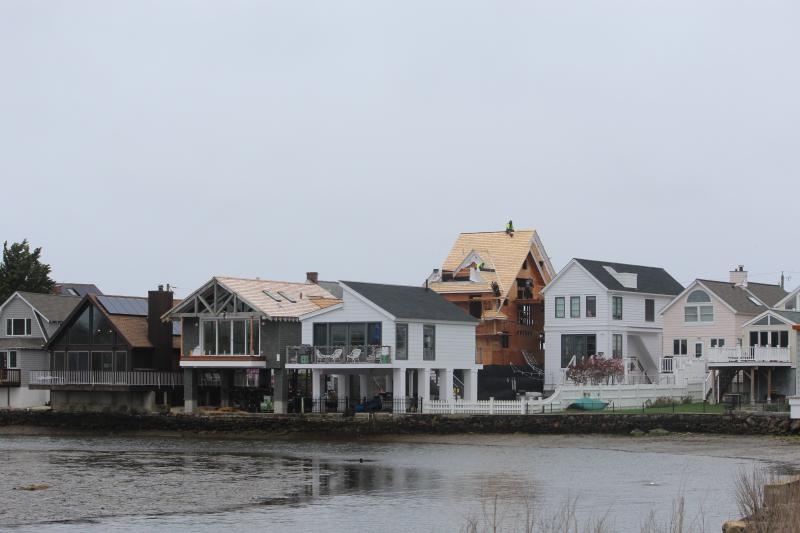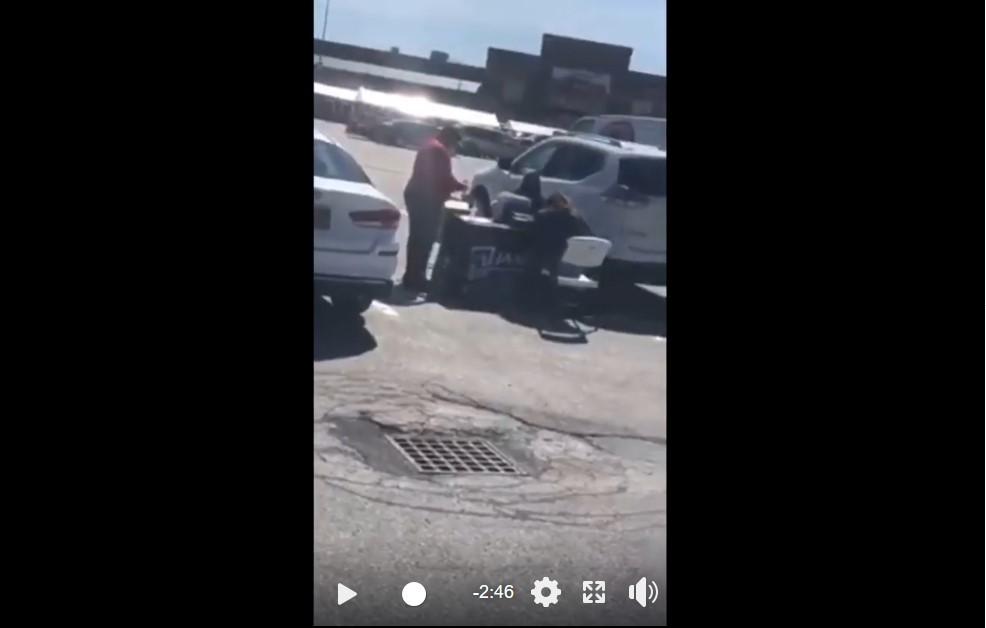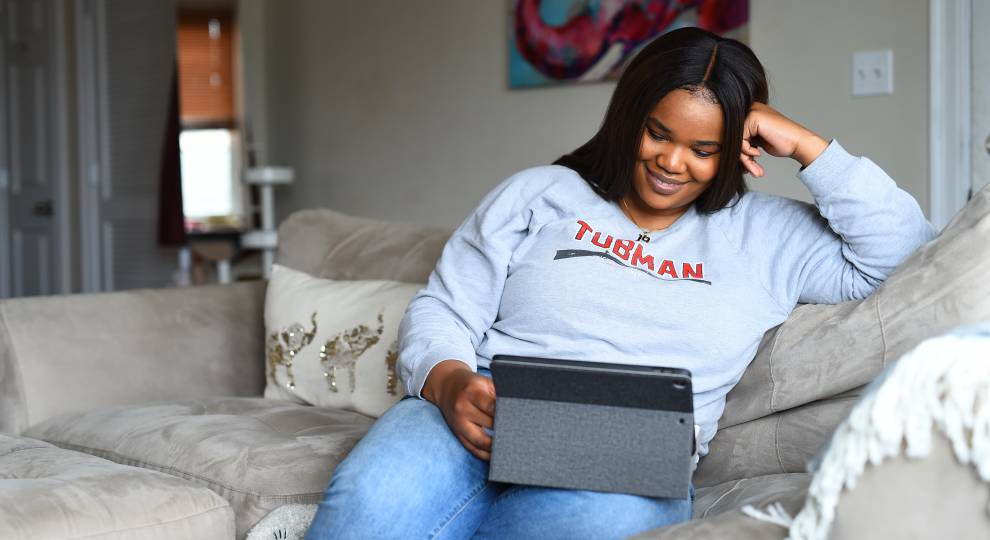Episode 203: How Zoning Rules Can Perpetuate Segregation; #BlackintheIvory Rises As Scholars Talk Racism In Academia
Racial segregation is a modern-day problem. This week on NEXT, we hear from an expert on how zoning rules continue to perpetuate segregation in New England. And we interview the co-founder of #BlackintheIvory about racism in academia. Plus, how can we cut carbon emissions during and after a pandemic?
Racial Segregation And The Role Of Zoning Laws In Excluding People Of Color From The Suburbs

Construction of a multi-million dollar beach-front property in Westport, Conn. Westport is among a number of Connecticut towns that a ProPublica investigation found blocked the construction of privately developed duplexes and apartments, leading to a lack of affordable housing units and segregated neighborhoods. (Jacquiline Rabe Thomas/Connecticut Mirror)
Racial segregation is a modern-day problem that is perpetuated in New England through local zoning laws.
That’s the argument from Sara Bronin, a land-use expert and law professor at the University of Connecticut, who talked to NEXT about the ways zoning can exclude people of color from affluent towns — and how the national reckoning over systemic inequalities can be an opportunity to push for change.
“It’s pretty clear that people of color tend to be excluded from suburbs and from, in some cases, rural areas,” Bronin said.
Bronin is part of a concerted effort underway called “Desegregate CT” to push for zoning reforms in Connecticut.
Two Separate Bias Incidents In Vermont, Two Disparate Responses

A screenshot from a video posted to Facebook that appears to show the man filming the video harassing two Latina women from New York as they recruit workers for their cleaning company in a Rutland, Vermont parking lot. (Elodie Reed/VPR)
Last month, Vermont Gov. Phil Scott publicly apologized to an African-American Vermonter who was harassed while driving a vehicle with New York license plates. Scott said the incident put a spotlight on the racism and xenophobia that has intensified during the coronavirus pandemic, and he ordered Vermont State Police to investigate the encounter.
But as Vermont Public Radio‘s Peter Hirschfeld reports, a separate encounter was captured on video that raises questions about how police deal with incidents of racial harassment or bias. The head of the Vermont chapter of the NAACP says that access to justice in Vermont can depend on where you live.
Co-Founder Of #BlackintheIvory Calls For Change In Academia To Confront Racism

Shardé M. Davis, communications professor at the University of Connecticut. (Courtesy of Shardé M. Davis)
Shardé M. Davis, communications professor at the University of Connecticut, is the co-founder of the Twitter hashtag #BlackintheIvory. Along with Joy Melody Woods, a Ph.D. student at the University of Texas at Austin, Davis sparked a public conversation about racism in academia when she tweeted out some of her own experiences as a Black scholar.
“We’ve never been able to share our stories,” Davis told NEXT. “The ivory tower is really shrouded.”
Since her initial tweets earlier this month, the hashtag has amplified the voices of Black scholars at universities across the country who have dealt with racism on the job and from white colleagues. Davis talked to NEXT about the changes she hopes #BlackintheIvory will spur.
Young, Black, Social And Safer At Home

Ayanna Polk, who lives in Dorchester – one of Boston’s hardest hit neighborhoods – says virtual fun has been a life line for Black millennials like herself who are combating isolation while trying to slow the spread of the virus in their communities. (Meredith Nierman/WGBH News)
COVID-19 is disproportionately infecting and killing Black people. And while younger, Black millennials are not the hardest-hit age group, many are still taking precautions this summer even as states re-open. WGBH Radio’s Saraya Wintersmith spoke to Black millennials in Boston who are being creative with their leisure activities and have decided to exclusively socialize — virtually — from their homes.
“When I’m in these social settings, I feel seen. I feel heard. I’m with people who can relate to my experience,” said Ayanna Polk, who lives in the city’s Dorchester neighborhood. “I know a lot of young professionals throughout the city are in places where they may not see themselves on teams or in leadership, so it can be culturally isolating.”
Pushing For More Climate Action During — And After — The Pandemic
Since the pandemic hit, carbon emissions have dropped globally. A study in “Nature Climate Change” found a 17 percent decrease in emissions by early April. In New England, data shows that air pollution and energy consumption are down.
But most climate scientists agree this decline is temporary without bigger, sustained policy changes at the federal level. On NEXT, we hear from scientists Rob Klee, lecturer at Yale University’s School of Forestry and Environmental Studies, and Alex Barron, assistant professor of environmental science and policy at Smith College, about how systemic change can happen during a pandemic — and what are the barriers.
NEXT Wants to Hear From You:
Last week, we asked what steps you could take to help dismantle systemic racism. What reforms would you like to see? Here’s what listener Stephanie Gomory, a spokesperson for Vermont Racial Justice Alliance, had to say:
“Personally, I’m in favor of the abolition of police just because we know that the system is not flawed. We know that it is working as it was designed to do, unfortunately. So it needs to be rebuilt, and/or restructured and re-imagined. And in order for that to happen, it needs to be removed. But in the meantime, we are advocating city council in Burlington to defund police and divert those funds to social programs and various other measures that will support communities of color in concrete ways.”
Let’s continue the conversation this week. Do you think police departments need to be restructured or defunded? Or if you disagree, why not? Leave a voicemail on our comment line: 860-275-7595. Or send us an email at next@ctpublic.org. We look forward to hearing from you.
Also On This Week’s Show:
About NEXT
NEXT is produced at Connecticut Public Radio
Host/Producer: Morgan Springer
Executive Editor: Vanessa de la Torre
Senior Director: Catie Talarski
Contributors to this episode: Peter Hirschfeld, Saraya Wintersmith and Beth Healy.
Guests: Sara Bronin, Stephanie Gomory, Alex Barron, Rob Klee and Shardé M. Davis.
Music: Todd Merrell, “New England” by Goodnight Blue Moon, “Nowhere to Run” by Billy Wylder, “Kid with a Camera” by Wise Old Moon and “Rialto” by Mile Twelve.
New to NEXT? You can find every episode or one you missed within our archives.
We want your feedback! Send critiques, suggestions, questions and ideas to next@ctpublic.org. Help us spread the word! If you like what you hear, rate and review us on iTunes.
